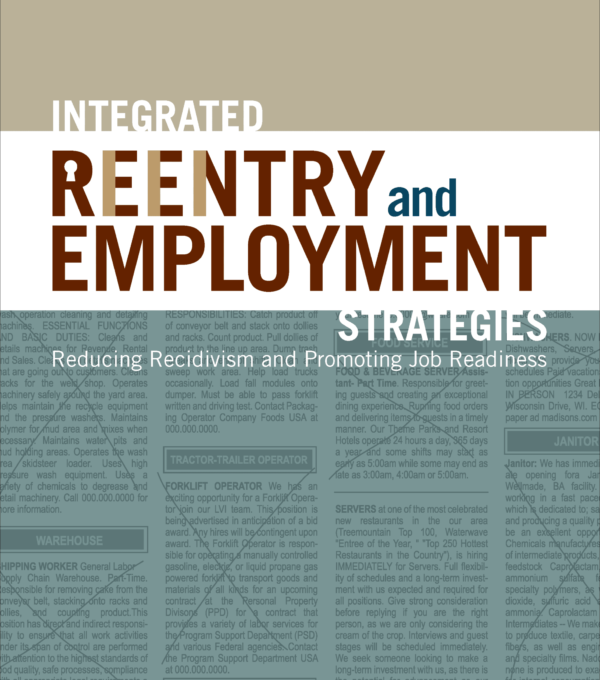Self-Assessment for Employment-Focused Reentry Programs
Measuring Fidelity to the Integrated Reentry and Employment Strategies (IRES) Framework
This self-assessment from the National Reentry Resource Center helps programs gauge their capacity to provide integrated reentry and employment interventions, including work readiness, to people with varying risks and needs. The tool helps reentry practitioners identify opportunities to build the capacity of their programming and services, which, in turn, can better prepare participants for employment and decrease their likelihood of returning to incarceration.
Finding employment is a critical part of successful reentry for the millions of people returning to communities after incarceration, but it’s not the only part. Appropriately addressing criminogenic risk and needs as well as the soft and hard skills necessary for the workplace are also key in reducing recidivism and improving long-term job retention in this population. Employment-focused reentry programs are often uniquely positioned to administer these services.
The self-assessment should be used in conjunction with the Integrated Reentry and Employment Strategies: Reducing Recidivism and Promoting Job Readiness (IRES) white paper, a resource released in 2013 that helps policymakers, practitioners, and system administrators ensure resources are being used effectively to improve employment outcomes for people who have been incarcerated or are on probation or parole.
Governors emphasized a wide range of criminal justice and behavioral health initiatives in this year’s state-of-the-state addresses. From…
Read MoreCorrections leaders balance the complex priorities of maintaining public safety, operating secure facilities, providing needed care and services…
Read MoreThe CSG Justice Center is pleased to announce 5 new members of its advisory board. Hailing from states…
Read More State of the States: Criminal Justice and Behavioral Health Priorities in 2025
State of the States: Criminal Justice and Behavioral Health Priorities in 2025
Governors emphasized a wide range of criminal justice and behavioral health initiatives in this year’s state-of-the-state addresses. From Alaska to Washington, governors across the U.S. highlighted significant progress in reducing crime rates, combating the opioid crisis, and expanding mental health services. They also noted areas for improvement, some of which will be legislative priorities in 2025.
Read More Apply Now for Resident Analyst Program to Increase Data Analysis Capacity at Departments of Corrections
Apply Now for Resident Analyst Program to Increase Data Analysis Capacity at Departments of Corrections
Corrections leaders balance the complex priorities of maintaining public safety, operating secure facilities, providing needed care and services to the incarcerated population, and coordinating with other agencies.
Read More Five New CSG Justice Center Board Members Look to Strengthen Communities and Improve Public Safety
Five New CSG Justice Center Board Members Look to Strengthen Communities and Improve Public Safety
The CSG Justice Center is pleased to announce 5 new members of its advisory board. Hailing from states across the country and representing multiple professions, they are all eager to join the 17 current members in establishing the policy and project priorities for the organization.
Read More Removing Barriers to Successful Reentry: Q&A with New CSG Justice Center Advisory Board Member Dr. Ronald F. Day
Removing Barriers to Successful Reentry: Q&A with New CSG Justice Center Advisory Board Member Dr. Ronald F. Day
The CSG Justice Center Advisory Board establishes the policy and project priorities of the organization. The board features a cross-section of leaders who shape criminal justice policy in various parts of the country.
Read More Transforming Lives with Access to Needed Mental Health Care: Q&A with New CSG Justice Center Advisory Board Member Dr. Courtney Harvey
Transforming Lives with Access to Needed Mental Health Care: Q&A with New CSG Justice Center Advisory Board Member Dr. Courtney Harvey
The CSG Justice Center Advisory Board establishes the policy and project priorities of the organization. The board features a cross-section of leaders who shape criminal justice policy in various parts of the country.
Read More Six States Commit to Improving Statewide Strategies to Address Youth Crime, Violence and Behavioral Health
Six States Commit to Improving Statewide Strategies to Address Youth Crime, Violence and Behavioral Health
The Council of State Governments (CSG) Justice Center has launched the Collaborating for Youth and Public Safety Initiative (CYPSI) in partnership with six states: California, New Mexico, New York, Ohio, Oklahoma, and Rhode Island. The initiative will help states develop, fund, and effectively implement a research-based service continuum to improve public safety and behavioral health, education, and other outcomes for youth.
Read More










